What's New
Displaying results 3091 - 3100 of 4914
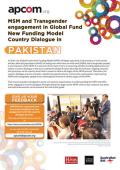
Resource | Publications,
In 2014, the Global Fund’s New Funding Model (NFM) will begin operating. Inclusiveness of civil society and key affected populations (KAP) (including men who have sex with men (MSM) and transgender people) is a key feature of the NFM. It is also one of the main criteria in assessing whether funding applications are robust. Country Dialogue is the term used by the Global Fund to describe the inclusive, ongoing consultative processes at the country level that is meant to inform all stages of the NFM process. Therefore, the country dialogue process presents a significant opportunity for civil society organisations representing MSM and transgender people to be meaningfully involved in all the stages of the NFM.
This resource guide is designed to assist civil society organisations in understanding the NFM and effectively engaging in country dialogue through all the key stages of the NFM.
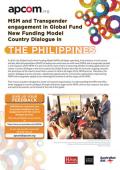
Resource | Publications,
In 2014, the Global Fund’s New Funding Model (NFM) will begin operating. Inclusiveness of civil society and key affected populations (KAP) (including men who have sex with men (MSM) and transgender people) is a key feature of the NFM. It is also one of the main criteria in assessing whether funding applications are robust. Country Dialogue is the term used by the Global Fund to describe the inclusive, ongoing consultative processes at the country level that is meant to inform all stages of the NFM process. Therefore, the country dialogue process presents a significant opportunity for civil society organisations representing MSM and transgender people to be meaningfully involved in all the stages of the NFM.
This resource guide is designed to assist civil society organisations in understanding the NFM and effectively engaging in country dialogue through all the key stages of the NFM.
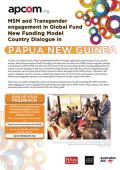
MSM and Transgender Engagement in Global Fund New Funding Model Country Dialogue in Papua New Guinea
Resource | Publications,
In 2014, the Global Fund’s New Funding Model (NFM) will begin operating. Inclusiveness of civil society and key affected populations (KAP) (including men who have sex with men (MSM) and transgender people) is a key feature of the NFM. It is also one of the main criteria in assessing whether funding applications are robust. Country Dialogue is the term used by the Global Fund to describe the inclusive, ongoing consultative processes at the country level that is meant to inform all stages of the NFM process. Therefore, the country dialogue process presents a significant opportunity for civil society organisations representing MSM and transgender people to be meaningfully involved in all the stages of the NFM.
This resource guide is designed to assist civil society organisations in understanding the NFM and effectively engaging in country dialogue through all the key stages of the NFM.
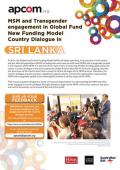
Resource | Publications,
In 2014, the Global Fund’s New Funding Model (NFM) will begin operating. Inclusiveness of civil society and key affected populations (KAP) (including men who have sex with men (MSM) and transgender people) is a key feature of the NFM. It is also one of the main criteria in assessing whether funding applications are robust. Country Dialogue is the term used by the Global Fund to describe the inclusive, ongoing consultative processes at the country level that is meant to inform all stages of the NFM process. Therefore, the country dialogue process presents a significant opportunity for civil society organisations representing MSM and transgender people to be meaningfully involved in all the stages of the NFM.
This resource guide is designed to assist civil society organisations in understanding the NFM and effectively engaging in country dialogue through all the key stages of the NFM.
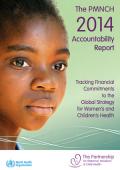
Resource | Publications,
This report reviews the progress made in implementing the financial commitments to the Global Strategy for Women’s and Children’s Health (Global Strategy). The strategy was launched by the United Nations Secretary- General (UNSG) Ban Ki-moon in September 2010 with the aim of saving 16 million lives in the world’s 49 poorest countries by 2015.
With the target date of the Millennium Development Goals (MDGs) in sight, the Global Strategy represents the most significant global effort to accelerate progress towards the health-related MDGs: MDG 4 (child survival), MDG 5 (maternal and reproductive health), MDG 6 (HIV, TB, and malaria), and MDG 1c (hunger). The Global Strategy identified six key areas in need of urgent action to improve women’s and children’s health. The Every Woman Every Child (EWEC) effort was established at the same time to advance the Global Strategy and to mobilize and intensify global action to improve reproductive, maternal, newborn, and child health (RMNCH).
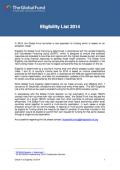
Resource | Data Sheets,
Eligibility for Global Fund financing is determined in accordance with the revised Eligibility and Counterpart Financing policy (ECFP), which is designed to ensure that available resources are allocated to countries and regions with the highest disease burden and least ability to bring financial resources to address these health problems. The Global Fund Eligibility List identifies which country components are eligible to receive an allocation in the new funding model. If a country has no eligible components they do not appear on the list.
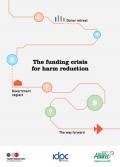
Resource | Publications,
Funding for HIV-related harm reduction programmes globally is in crisis. There can be no ‘AIDS free generation’ without targeted efforts with and for people who inject drugs, yet, as this report shows, funding for harm reduction falls dangerously short of estimated need. As a result, coverage of essential HIV and harm reduction programmes targeting people who inject drugs is very low and wholly inadequate to respond effectively to HIV among this community. While this has been the case for some time, the data and policy analysis conducted for this report shows that rather than action being taken to address this problem, the situation looks set to deteriorate.
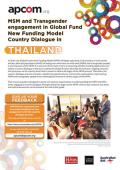
Resource | Publications,
In 2014, the Global Fund’s New Funding Model (NFM) will begin operating. Inclusiveness of civil society and key affected populations (KAP) (including men who have sex with men (MSM) and transgender people) is a key feature of the NFM. It is also one of the main criteria in assessing whether funding applications are robust. Country Dialogue is the term used by the Global Fund to describe the inclusive, ongoing consultative processes at the country level that is meant to inform all stages of the NFM process. Therefore, the country dialogue process presents a significant opportunity for civil society organisations representing MSM and transgender people to be meaningfully involved in all the stages of the NFM.
This resource guide is designed to assist civil society organisations in understanding the NFM and effectively engaging in country dialogue through all the key stages of the NFM.
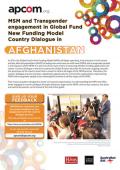
Resource | Publications,
In 2014, the Global Fund’s New Funding Model (NFM) will begin operating. Inclusiveness of civil society and key affected populations (KAP) (including men who have sex with men (MSM) and transgender people) is a key feature of the NFM. It is also one of the main criteria in assessing whether funding applications are robust. Country Dialogue is the term used by the Global Fund to describe the inclusive, ongoing consultative processes at the country level that is meant to inform all stages of the NFM process. Therefore, the country dialogue process presents a significant opportunity for civil society organisations representing MSM and transgender people to be meaningfully involved in all the stages of the NFM.
This resource guide is designed to assist civil society organisations in understanding the NFM and effectively engaging in country dialogue through all the key stages of the NFM.
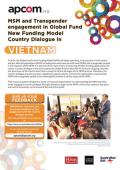
Resource | Publications,
In 2014, the Global Fund’s New Funding Model (NFM) will begin operating. Inclusiveness of civil society and key affected populations (KAP) (including men who have sex with men (MSM) and transgender people) is a key feature of the NFM. It is also one of the main criteria in assessing whether funding applications are robust. Country Dialogue is the term used by the Global Fund to describe the inclusive, ongoing consultative processes at the country level that is meant to inform all stages of the NFM process. Therefore, the country dialogue process presents a significant opportunity for civil society organisations representing MSM and transgender people to be meaningfully involved in all the stages of the NFM.
This resource guide is designed to assist civil society organisations in understanding the NFM and effectively engaging in country dialogue through all the key stages of the NFM.





